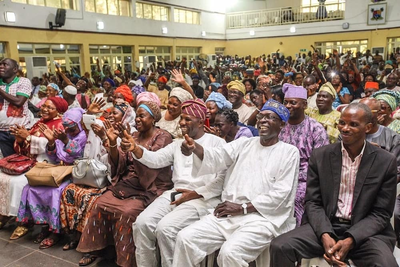How a rotten civil service cripples anti-graft war in Nigeria – from Ripples Nigeria . . . .
Not many Nigerians were stunned recently when revelations came to light that a cartel in the federal civil service made up of senior officers, as well as others from the ranks, tagged ‘budget mafia’ had smuggled items into the budget proposal submitted to President Muhammadu Buhari amounting to about N1.7 trillion.
The mild surprise stems from the knowledge that civil servants at all levels of government have been severally accused of being the brains behind a lot of corrupt practices in the ministries, and government departments, and being the ones showing corrupt politicians the ‘way things are done’.
The expose on the budget mafia is only one of the several corrupt practices in Nigeria’s civil service which has over the years been grappling with the evil of ghost workers, which a few people have been using to siphon government funds to their private pockets.
To say the spectre of ghost workers within the nation’s civil service, whether at the state or federal civil level, has reached an alarming high is simply stating the obvious. The regularity of salary scams and all such related sleaze have left the different tiers of government locked in a constant battle to checkmate the activities of saboteurs in the system.
Startling revelations
Alarmed by the unprecedented losses incurred in cost as a result of the ghost workers menace, the federal government had recently constituted a probe panel to investigate alleged salary scam within the federal civil service.
Civil servants at all levels of government have been severally accused of being the brains behind a lot of corrupt practices in the ministries, and government departments, and being the ones showing corrupt politicians the ‘way things are done’.
The probe panel, Ripples Nigeria learnt, uncovered a total of 23, 306 civil servants and some banks’ officials who may be part of a syndicate swindling the government. Following this discovery, government is said to have embarked on a process of investigating and removing the indicted civil servants from its payroll.
Ripples Nigeria was reliably informed that out of 312,306 civil servants whose bank accounts were checked through the Bank Verification Number platform, over 23,306 individuals had issues with their accounts.
How BVN tamed the monster of ghost workers
The Bank Verification Number is a number that uniquely identifies each bank’s customer for “Know Your Customer” (KYC) purposes. According to the ministry, the strategy of using BVN rather than requiring the physical presence of each member of staff has significantly simplified and accelerated the progress of the project and at a lower cost than previously incurred. A source, who would not be named, said the adoption of the BVN for salary payment helped the Federal Ministry of Finance to check the details of about 312,000 civil servants.
The source said, “Out of the accounts of about 312,000 civil servants processed so far, the ministry was said to have uncovered irregularities in the account of about 23,306. They are suspected to have been collecting double salary. “These indicted individuals are in two categories. In the first group, we found out that the names of some civil servants whose salaries are being processed are different from the names on the accounts where their salaries are paid. What this means is either those in this category are drawing salary from two sources (which could be different parastatals), or they are ghost workers.”
The expose on the budget mafia is only one of the several corrupt practices in Nigeria’s civil service which has over the years been grappling with the evil of ghost workers, which a few people have been using to siphon government funds to their private pockets. The source said by the time the ongoing investigation is concluded, Nigerians will be shocked by the sheer number of servants who may be forced to resign as a result of their complicity in the salary scam.
Contacted, the Special Adviser to the Minister of Finance on Media Matters, Mr. Festus Akanbi, declined to comment on the report of the exercise, which he described as ongoing, saying the public will be appropriately briefed when the full report is ready. The adoption of the BVN became inevitable due to the failure of the Integrated Payroll Personnel Information System (IPPIS) to effectively deal with the issue of ghost workers in the federal civil service.
A recurring decimal
It would be recalled that the immediate past Minister of Finance and Coordinating Minister for the Economy, Dr Ngozi Okonjo Iweala had last year revealed that the federal government has blocked a N208.7 billion ghost workers scam in government parastatals and agencies after a biometric collection exercise carried out to get a proper data of federal civil servants revealed that 62,893 of the workers who were hitherto on the payroll of the federal government were ghost workers.
Okonjo-Iweala said at the time that the federal government has been able to save about N208.7 billion usually expended as salaries and benefits on these ghost workers.
States are not exempted
The monumental ghost-worker bug is also eating the fabrics of the civil service of virtually all states in the country. According to a report released last year, Ekiti State was said to lose N63 million monthly to the fraud, while the figure for Zamfara State is N2 billion annually. In Kebbi State, the loss amounts to N153 million monthly, in Bayelsa State it’s N3.5 billion annually and Kogi State N700 million per month.
The probe panel, Ripples Nigeria learnt, uncovered a total of 23, 306 civil servants and some banks’ officials who may be part of a syndicate swindling the government. Interestingly, Lagos State, believed to be ahead of other states in tackling the fraud, recovered N250 million through its innovative Oracle payment system last year. The adoption of information technology innovations like the IPPIS at the FG level, Oracle in Lagos State and the biometric system by some states, seems to have become inevitable with the oozing penchant of incorrigibly prodigal public pay officers, their cohorts and sponsors to loot government coffers dry.
Investigations revealed that poor administration of pension funds may have resulted in the colossal loss of about 30 per cent of the funds to ghost workers. In many cases, names of dead persons are still left on payrolls and all manner of entitlements are claimed on their behalf. In some cases also, names of individuals who were never in the employ of government are used to claim money.
In respect of the pensions, the sour story of corruption is not different. For example, the audit carried out by the Office of the Head of Civil Service of the Federation (OHCSF) in late 2014 allegedly revealed “71,135 ghost pensioners on the government payroll,” leading to the recovery of over N1.5billion hitherto being deliberately or carelessly paid to the said ghost pensioners.
Rebuttal
Mr. Rasheed Haruna Imran, Director of Communication at the Office of Head of Civil Service of the Federation (OHCSF), while speaking with Ripples Nigeria, on the alleged culpability of staff engaged in the ghost workers saga, declined comments, saying he was not authorised to speak on such matters except the Permanent Secretary.
Shedding more light on the foregoing, Mr. Folu Olamiti, spokesman of the Independent Corrupt Practices and Other Related Offences Commission (ICPC) recalled that the former minister of Finance directed that the ICPC go ahead and investigate those fingered in the ghost workers’ racket, assuring that investigation was ongoing.
You may also read: I’m a Nigerian, I’m not a criminal, Buhari says “I can assure you that investigation is still ongoing and we will make public our findings at the right time”, he said.
Punitive measures to stem the tide of ghost workers
As part of measures to curb the incidence of sleaze in the system, the federal government has summarily sacked some senior civil servants for extorting money from 400 applicants and offering them employment illegally.
The Minister of Information and Culture, Alhaji Lai Mohammed blew the whistle on the activities of some unscrupulous individuals in his ministry. A source, who would not be named, said the adoption of the BVN for salary payment helped the Federal Ministry of Finance to check the details of about 312,000 civil servants. Mohammed recently said the affected officers were on Grade Level 17 in one of the parastatals in his ministry, some of who had included the names of the applicants in the Integrated Payroll and Personnel System (IPPIS) before the fraud was discovered.
“The first scandal I met in one of the parastatals when I assumed office was the illegal employment of 400 people,” he said. “This scandal started with very senior officers up to level 17 in that department. They sent out letters and text messages asking people to apply for jobs for a fee of N400, 000 and they were given letters of employment. “They did not stop there. They invited these people to go and be captured on the IPPIS and they even took cameras to hotels to get them captured. At the end of the day the bubble burst. “One of the victims told these officials, ‘you cannot take my money and still disengage me. I have a valid letter’.”






